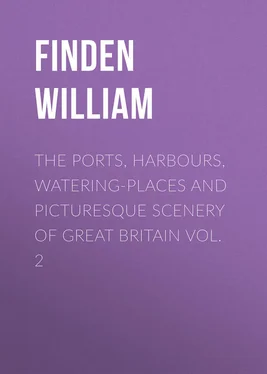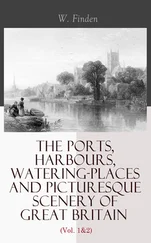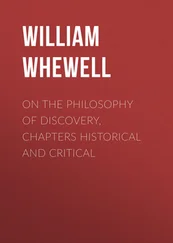William Finden - The Ports, Harbours, Watering-places and Picturesque Scenery of Great Britain Vol. 2
Здесь есть возможность читать онлайн «William Finden - The Ports, Harbours, Watering-places and Picturesque Scenery of Great Britain Vol. 2» — ознакомительный отрывок электронной книги совершенно бесплатно, а после прочтения отрывка купить полную версию. В некоторых случаях можно слушать аудио, скачать через торрент в формате fb2 и присутствует краткое содержание. Жанр: visual_arts, foreign_antique, foreign_prose, на английском языке. Описание произведения, (предисловие) а так же отзывы посетителей доступны на портале библиотеки ЛибКат.
- Название:The Ports, Harbours, Watering-places and Picturesque Scenery of Great Britain Vol. 2
- Автор:
- Жанр:
- Год:неизвестен
- ISBN:нет данных
- Рейтинг книги:3 / 5. Голосов: 1
-
Избранное:Добавить в избранное
- Отзывы:
-
Ваша оценка:
- 60
- 1
- 2
- 3
- 4
- 5
The Ports, Harbours, Watering-places and Picturesque Scenery of Great Britain Vol. 2: краткое содержание, описание и аннотация
Предлагаем к чтению аннотацию, описание, краткое содержание или предисловие (зависит от того, что написал сам автор книги «The Ports, Harbours, Watering-places and Picturesque Scenery of Great Britain Vol. 2»). Если вы не нашли необходимую информацию о книге — напишите в комментариях, мы постараемся отыскать её.
The Ports, Harbours, Watering-places and Picturesque Scenery of Great Britain Vol. 2 — читать онлайн ознакомительный отрывок
Ниже представлен текст книги, разбитый по страницам. Система сохранения места последней прочитанной страницы, позволяет с удобством читать онлайн бесплатно книгу «The Ports, Harbours, Watering-places and Picturesque Scenery of Great Britain Vol. 2», без необходимости каждый раз заново искать на чём Вы остановились. Поставьте закладку, и сможете в любой момент перейти на страницу, на которой закончили чтение.
Интервал:
Закладка:
William Finden
The Ports, Harbours, Watering-places and Picturesque Scenery of Great Britain Vol. 2
BERWICK. – LIGHTHOUSE ON THE PIER
The view of the Lighthouse, at the head of Berwick Pier (which forms the vignette to our Second Volume), is taken from the entrance to the harbour, about half a mile below the bridge. This Pier, the building of which was commenced in 1810, stands on the north side of the river, and is chiefly erected on the foundations of an old one, which is said to have been built in the reign of Queen Elizabeth. From the lighthouse, which was finished in 1826, two lights are exhibited at night, the one above the other. The upper one, which is of a pale, white colour, is lighted from sunset to sunrise; the lower one, which is of a bright red, is a tide-light, and is only displayed during the time that there is ten feet water on the bar.
Berwick Harbour is not well adapted for vessels of large burthen, for the greater part of the shore, in front of the quay, is dry at low water. On the Tweedmouth side, near the Car Rock, is the best water within the bar; and a vessel drawing from sixteen to eighteen feet water may lie there at all hours of the tide without touching the ground. The entrance to the harbour is narrow, as a bank of sand stretches out to the eastward, from the Spittal shore, to the extent of nearly half a mile, and approaches to within a cable's length of the rocks on the north. When the wind is from the eastward, there is always a swell on the bar; and the ebb-tide – more especially when there is a fresh in the river, in consequence of rain – runs out with such velocity that it is impossible for a vessel to make head against it. Vessels bound for Berwick, which cannot take the harbour in bad weather, usually seek shelter in Leith Roads.
The salmon fishery forms a most important branch of the trade of Berwick. About the middle of the last century, the fish used chiefly to be conveyed to London by small vessels of about forty tons burthen, belonging to Harwich and Gravesend, engaged by the London dealers; the fresh-caught salmon and gilse were conveyed in wells in the hold, but a large portion was sent pickled in kits. About 1787, the practice of packing salmon in pounded ice was suggested by George Dempster, Esq., of Dunnichen, then M.P. for Cupar, to Mr. John Richardson, a salmon-dealer, of Perth, who immediately adopted it; and the next year the salmon-dealers of Berwick followed his example.
Most of the salmon sent from Berwick to London are caught between the mouth of the Tweed and Norham, which is about eight miles up the river, and the highest point to which the tide flows. In 1799, the yearly rental of the fisheries within this distance, on both sides of the river, was estimated at £10,000; and in 1817 it was nearly double that sum. In consequence of the decline of the salmon fishery since 1820, it does not at the present time exceed £9,000. Various causes have been assigned for the decline of the salmon fishery in the Tweed; such as the building of the New Pier at the north side of the harbour; with the draining of lands and the destruction of fish in close time towards the upper parts of the river. How the building of the New Pier, and the draining of lands in Selkirk and Roxburghshire affect the breed of salmon, has not been clearly shown; and poaching in close time has not prevailed to a greater extent during the last twenty years than in the twenty years previous to 1816. The unremitting manner in which the river was legally fished between the mouth of the Tweed and Norham, from 1800 to 1817, is more likely to have been one great cause of the decline; but the proprietors of the fisheries seem unwilling to admit that a river may be over-fished, as well as land exhausted by over-cropping.
It can scarcely be said that there is a public market for salmon in Berwick, almost all that are caught being engrossed by factors or fish-curers, and sent to London; and salmon is generally as dear there as in the metropolis. The fish, as soon as caught, are packed in large boxes, between layers of pounded ice, and in this manner conveyed to the metropolis.
THE MERSEY. FROM LIVERPOOL
"A thousand keels the subject wave divide, —
Float with the flow, or stem the ebbing tide, —
Winged messengers that haste, with sails unfurl'd,
To barter produce with some distant world! —
With oar and paddle, sail and thundering steam,
They row – they cleave – they plough the Mersey's stream;
That stream, which, fretted by a thousand prows,
No silent rest, no liquid slumber knows;
Whate'er the hour, whatever wind prevail,
Behold the outward and the homeward sail!"
The Mersey is to Liverpool what the Thames is to London – the grand channel of mercantile prosperity – the main artery that carries health and vigour into the heart of the city, and thence distributes them by a thousand ramifications through all classes of the community. The navigation of this river has long been an object of primary import to the prosperity of our national trade; and therefore every suggestion which promised to obviate and remove those impediments which nature had thrown in the way, has been met with the greatest promptness and liberality. Whatever it was possible for art to accomplish has been attempted, and that so successfully that, if the ultimate object has not yet been obtained, the navigation of the Mersey has at least been rendered comparatively safe and expeditious. The grand enterprise for facilitating the intercourse between Liverpool and Manchester was commenced in 1720, when a canal was formed, and the navigation of the Mersey and Irwell was so greatly improved, that the "flats" – which were previously ten or eleven days in going from one town to the other – could now, by taking advantage of the tide, accomplish the same distance in as many hours. How amazingly this distance has been again shortened in our own times, by the introduction of steam power, is familiar to every one.
The rise and expansion of Liverpool – in all that regards it as a mercantile emporium – have taken place within the last two centuries. In 1650, the town – a mere fishing hamlet – consisted of only five or six streets. A pool, branching from the river, extended over the space now occupied by the new Custom-house and the three streets adjoining; and, for the convenience of intercourse, a ferry-boat was kept at the corner of Church-street and Whitechapel. This ferry was at last superseded by a bridge, erected by the proprietor of the land, Lord Molyneux; and since that period the advancement of the Mersey in the list of great navigable rivers has been unprecedentedly rapid and successful. The grand municipal improvements, however, have all been effected within the last century. During that interval, splendid squares, streets, and public monuments have sprung up into existence. Previously to that epoch there was no spirit, no scope for commercial enterprise, and consequently no harbour, nor dock, nor warehouse. But now spacious harbours extend for several miles along the bank of the Mersey: on the bosom of the river stately merchantmen, outward or homeward bound, laden with the produce of every clime, are continually passing and repassing; while the usual embellishments which follow a train of successful industry are apparent at every step of our progress, adding ever varying features of beauty and animation to the landscape. He who would form a just estimate of the vast and unlimited resources of this great commercial city, should spend at least a day, partly in a promenade along the banks, and partly on the spring-tide of the Mersey.
This river is navigable for vessels of considerable burden so far as the mouth of the Irwell, – a distance of thirty-five miles from Liverpool.
Читать дальшеИнтервал:
Закладка:
Похожие книги на «The Ports, Harbours, Watering-places and Picturesque Scenery of Great Britain Vol. 2»
Представляем Вашему вниманию похожие книги на «The Ports, Harbours, Watering-places and Picturesque Scenery of Great Britain Vol. 2» списком для выбора. Мы отобрали схожую по названию и смыслу литературу в надежде предоставить читателям больше вариантов отыскать новые, интересные, ещё непрочитанные произведения.
Обсуждение, отзывы о книге «The Ports, Harbours, Watering-places and Picturesque Scenery of Great Britain Vol. 2» и просто собственные мнения читателей. Оставьте ваши комментарии, напишите, что Вы думаете о произведении, его смысле или главных героях. Укажите что конкретно понравилось, а что нет, и почему Вы так считаете.












